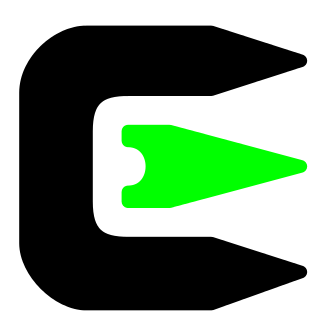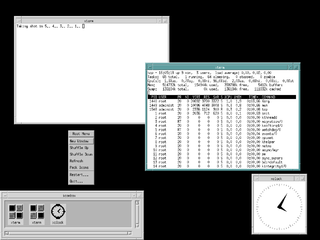
Cygwin is a Unix-like environment and command-line interface for Microsoft Windows. Cygwin's purpose is expressed in its motto: "Get that Linux feeling – on Windows".

The GNU Lesser General Public License (LGPL) is a free-software license published by the Free Software Foundation (FSF). The license allows developers and companies to use and integrate a software component released under the LGPL into their own software without being required by the terms of a strong copyleft license to release the source code of their own components. However, any developer who modifies an LGPL-covered component is required to make their modified version available under the same LGPL license. For proprietary software, code under the LGPL is usually used in the form of a shared library, so that there is a clear separation between the proprietary and LGPL components. The LGPL is primarily used for software libraries, although it is also used by some stand-alone applications.
The Q Public License (QPL) is a non-copyleft license, created by Trolltech for its free edition of the Qt. It was used until Qt 3.0, as Trolltech toolkit version 4.0 was released under GPL version 2.

In computing, Motif refers to both a graphical user interface (GUI) specification and the widget toolkit for building applications that follow that specification under the X Window System on Unix and Unix-like operating systems. The Motif look and feel is distinguished by its use of rudimentary square and chiseled three-dimensional effects for its various user interface elements.

wxWidgets is a widget toolkit and tools library for creating graphical user interfaces (GUIs) for cross-platform applications. wxWidgets enables a program's GUI code to compile and run on several computer platforms with minimal or no code changes. A wide choice of compilers and other tools to use with wxWidgets facilitates development of sophisticated applications. wxWidgets supports a comprehensive range of popular operating systems and graphical libraries, both proprietary and free, and is widely deployed in prominent organizations.

The GNU Project is a free software, mass collaboration project announced by Richard Stallman on September 27, 1983. Its goal is to give computer users freedom and control in their use of their computers and computing devices by collaboratively developing and publishing software that gives everyone the rights to freely run the software, copy and distribute it, study it, and modify it. GNU software grants these rights in its license.
Open Inventor, originally IRIS Inventor, is a C++ object-oriented retained mode 3D graphics toolkit designed by SGI to provide a higher layer of programming for OpenGL. Its main goals are better programmer convenience and efficiency. Open Inventor exists as both proprietary software and free and open-source software, subject to the requirements of the GNU Lesser General Public License (LGPL), version 2.1.
A GPL linking exception modifies the GNU General Public License (GPL) in a way that enables software projects which provide library code to be "linked to" the programs that use them, without applying the full terms of the GPL to the using program. Linking is the technical process of connecting code in a library to the using code, to produce a single executable file. It is performed either at compile time or run-time in order to produce functional machine-readable code. The Free Software Foundation states that, without applying the linking exception, a program linked to GPL library code may only be distributed under a GPL-compatible license. This has not been explicitly tested in court, but linking violations have resulted in settlement. The license of the GNU Classpath project explicitly includes a statement to that effect.

Fast Light Toolkit is a cross-platform widget library for graphical user interfaces (GUIs), developed by Bill Spitzak and others. Made to accommodate 3D graphics programming, it has an interface to OpenGL, but it is also suitable for general GUI programming.

PyQt is a Python binding of the cross-platform GUI toolkit Qt, implemented as a Python plug-in. PyQt is free software developed by the British firm Riverbank Computing. It is available under similar terms to Qt versions older than 4.5; this means a variety of licenses including GNU General Public License (GPL) and commercial license, but not the GNU Lesser General Public License (LGPL). PyQt supports Microsoft Windows as well as various kinds of UNIX, including Linux and MacOS.

The FOX toolkit is an open-source, cross-platform widget toolkit, i.e. a library of basic elements for building a graphical user interface (GUI). FOX stands for Free Objects for X.

ROOT is an object-oriented computer program and library developed by CERN. It was originally designed for particle physics data analysis and contains several features specific to the field, but it is also used in other applications such as astronomy and data mining. The latest minor release is 6.28, as of 2023-02-03.
Filesystem in Userspace (FUSE) is a software interface for Unix and Unix-like computer operating systems that lets non-privileged users create their own file systems without editing kernel code. This is achieved by running file system code in user space while the FUSE module provides only a bridge to the actual kernel interfaces.
Clutter is a discontinued GObject-based graphics library for creating hardware-accelerated user interfaces. Clutter is an OpenGL-based 'interactive canvas' library and does not contain any graphical control elements. It relies upon OpenGL (1.4+) or OpenGL ES for rendering,. It also supports media playback using GStreamer and 2D graphics rendering using Cairo.

The GNU General Public License is a series of widely used free software licenses or copyleft that guarantee end users the four freedoms to run, study, share, and modify the software. The license was the first copyleft for general use and was originally written by Richard Stallman, the founder of the Free Software Foundation (FSF), for the GNU Project. The license grants the recipients of a computer program the rights of the Free Software Definition. These GPL series are all copyleft licenses, which means that any derivative work must be distributed under the same or equivalent license terms. It is more restrictive than the Lesser General Public License and even further distinct from the more widely used permissive software licenses BSD, MIT, and Apache.
The GTK-server project aims to bring graphical user interface (GUI) programming to any interpreted language using the GNU Image Manipulation Program (GIMP) ToolKit (GTK) or XForms. It releases free and open-source software under the GNU General Public License.
Mapnik is an open-source mapping toolkit for desktop and server based map rendering, written in C++. Artem Pavlenko, the original developer of Mapnik, set out with the explicit goal of creating beautiful maps by employing the sub-pixel anti-aliasing of the Anti-Grain Geometry (AGG) library. Mapnik now also has a Cairo rendering backend. For handling common software tasks such as memory management, file system access, regular expressions, and XML parsing, Mapnik utilizes the Boost C++ libraries. An XML file can be used to define a collection of mapping objects that determine the appearance of a map, or objects can be constructed programmatically in C++, Python, and Node.js.
The following outline is provided as an overview of and topical guide to the Perl programming language:








